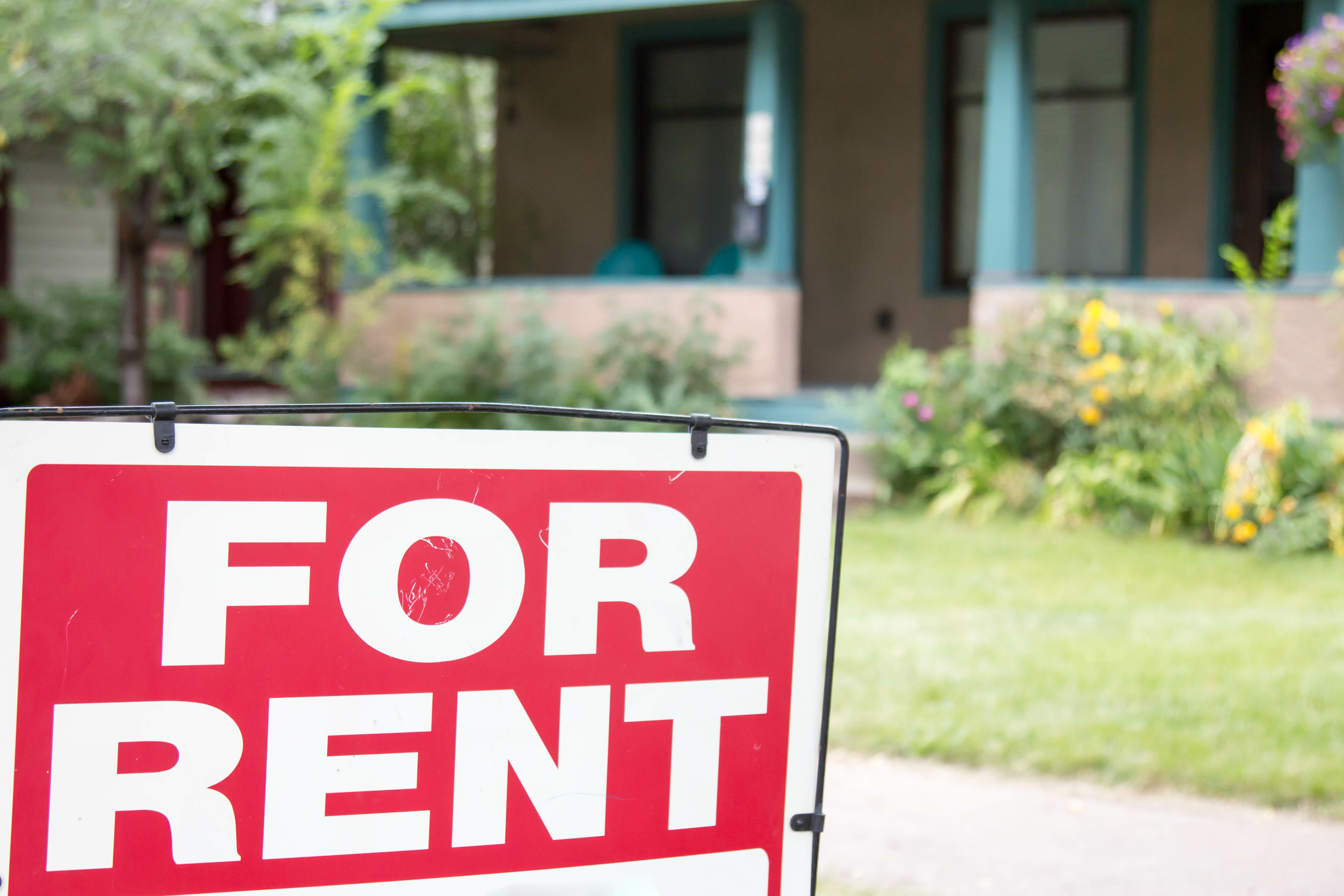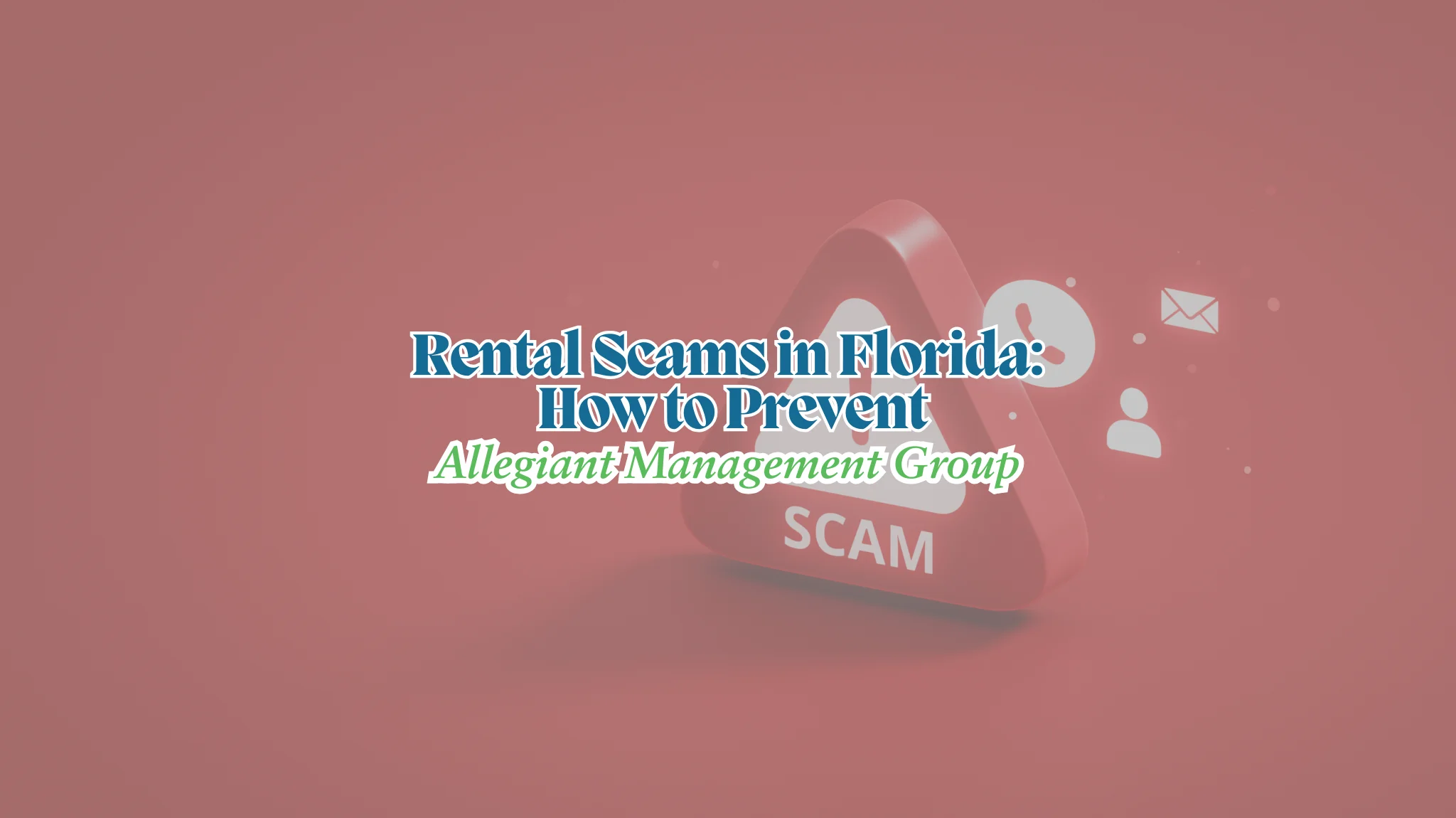Last Updated: July 21, 2025
📌 Table of Contents
- Am I Getting Scammed
- Warning Signs & Understanding Rental Scams
- Common Types of Rental Scams
- Rental Scam Red Flags to Watch Out For
- How to Spot a Rental Scam in 2025
- Social Media: Rental Scams on Craigslist and Facebook
- Steps to Prevent Rental Scams 2025
- Verifying Property and Landlord Legitimacy
- What to Do If You Encounter a Rental Scammer in 2025
- Rental Scams in Specific Regions: Focus on Florida
- Four Tips to Protect Yourself From Rental Scams
- Protect Your Rental Experience with Allegiant Management Group
- Frequently Asked Questions (FAQs) - Rental Scams 101
Rental Scams 101: Rental Scams How to Avoid Them

Navigating the rental market can be a daunting task. It becomes even tougher when rental frauds come into play. Rental scams are fraudulent activities aimed at potential renters.
They can range from fake listings to phantom rentals, causing significant financial and emotional distress to victims. In the digital age, rental scams have found a new playground.
Am I Getting Scammed
Online platforms like Zillow, Craigslist, and Facebook Marketplace are common places for rental scams. Knowing how to spot these scams and prevent them is important.
It involves spotting warning signs like prices that seem too good to be true. It also includes high-pressure sales tactics. Sometimes, it can be as simple as utilizing gift cards for the transaction or the scammer using a long distance phone number.
Avoiding rental fraud necessitates a proactive strategy. This means checking who owns the property, setting up in-person viewings, and knowing your rights as a renter. Seeing the property in person and meeting the potential landlord sometimes add additional assurance.
In this guide, we'll delve into rental scams and how to prevent them. We'll provide actionable tips to help you navigate the rental market safely and confidently.
Warning Signs & Understanding Rental Scams
Rental scams are cunning schemes designed to swindle potential tenants. Scammers typically pose as landlords or agents, offering appealing property deals.
The allure is often tempting, with monthly rent prices far below market value to captivate unsuspecting renters. These scams exploit people who are vulnerable, especially in online spaces.
Stunning images of homes that are either fake or not available for rent often deceive individuals. Understanding the different tricks used by these fraudsters is the first step in protecting yourself.
With this awareness, prospective renters can move forward carefully, equipped with the insight to spot and steer clear of scams

Common Types of Rental Scams
Rental scams come in many forms, each with its own tactics to deceive renters. These scams often leave victims in financial distress, desperate for a place to live.
- Fake Listings: Scammers post properties that do not exist or are not available for rent.
- Phantom Rentals: They advertise a property they have no connection to, taking deposits for it.
- Hijacked Ads: Someone replicates and shares authentic listings online. They show fake contact information to collect personal details for a credit check.
Rental Scam Red Flags to Watch Out For

These are scams we frequently see, some of the things you should look out for is:
- Be wary of properties priced significantly below market value. Offers that appear too good to be true usually aren't genuine.
- High-pressure sales tactics are another red flag. Landlords pushing for immediate action may be attempting to scam.
- Pay attention to communication methods. Scammers often communicate only via email or text, avoiding personal interaction.
How to Spot a Rental Scam in 2025

Spotting a rental scam requires keen observation and skepticism. Being critical of every detail in listings is essential. Scrutinize any errors that may arise during your rental search.
Discrepancies between listing specifics and the property description should be alarming. Confirm details like dimensions, location, and features. Any inconsistencies might suggest a deceptive listing designed to mislead potential buyers.
Conduct research on the landlord or property manager. Exercise caution if they refuse to offer identification or ownership proof. Authentic landlords are open and willing to share essential details. Avoid dealings with those hesitant to share pertinent details.
Social Media: Rental Scams on Craigslist and Rental Scams on Facebook
The rise of online platforms like Craigslist and Facebook has created new chances for rental scammers. These sites are popular because they are easy to use and have many users. However, they also attract fraudsters who want to trick unsuspecting renters.
On Craigslist, scammers often post fake listings that look real at first. They use real photos of properties from legitimate sources. This makes the listings seem more trustworthy to potential renters.
Facebook groups also see many rental scams. Scammers may pretend to be landlords or property managers in these groups. Always check if the listing is real and confirm the identity of anyone you talk to. Never rush into agreements based only on online chats.
Steps to Prevent Rental Scams 2025

- Check average rental prices in nearby areas.
- Confirm property ownership on the local appraiser's website.
- Meet the landlord and visit the property.
- Avoid wiring money or a money transfer. Use safe payment methods only.
- Do not fill out a rental application or sign a lease until you confirm ownership.
Verifying Property and Landlord Legitimacy

Checking that both the property and the landlord are real is important. This helps prevent rental scams. Begin by checking public records to confirm property ownership. You can usually complete this through the local property appraiser’s website.
Reaching out to the landlord via official or verified channels is essential. Exercise caution if the landlord hesitates to offer identification or verification documents. A genuine landlord will readily supply this information.
Additionally, ask for references from past tenants. Their feedback can give useful information about the landlord’s reputation and the property’s condition. A good landlord will easily provide references for your peace of mind.
What to Do If You Encounter a Rental Scammer in 2025
Encountering a rental scammer can be upsetting, but acting quickly is important. Initially, cease all interactions with the scammer. This prevents them from obtaining further details about you.
Next, report the scam to the right authorities. Contact your local police and file a complaint with the Federal Trade Commission (FTC) online. They have an internet crime complaint center for these claims. Reporting helps track scam patterns and may prevent others from falling victim to scams.
Also, notify the platform where you found the property listing, like Craigslist or Facebook. Give them all the relevant information to help remove fake listings. Always keep a record of your interactions for future reference.
Rental Scams in Specific Regions: Focus on Florida
Florida has become a hotspot for rental scams, especially in popular tourist areas. The high demand for vacation rentals creates opportunities for fraudsters to exploit eager renters.
Rental scams in Florida are becoming more popular each day. Scams like these are affecting renters on a daily basis. Avoid becoming the next target of rental fraud schemes.
Four Tips to Protect Yourself From Rental Scams
- Do not send money or start wire transfers for application fees, security deposits, or rent. Always check that you are dealing with the real property owners.
- Don't share personal information.
- This includes bank account numbers, Social Security Numbers, driver’s license details, and credit card information.
- Be careful when dealing with rental properties. Scammers may pressure you by saying it's for checking your credit score, doing a background check, or to review credit reports. Only proceed once you verify the source.
Protect Your Rental Experience with Allegiant Management Group
Looking for a trusted property management partner to help you navigate the rental market? At Allegiant Management Group, we prioritize transparency, safety, and your peace of mind.
Let us handle the complexities of property management while you enjoy a stress-free renting experience. Contact us today to see how we can help!
Frequently Asked Questions (FAQs) - Rental Scams 101
What are the most common signs of a rental scam?
Common signs of a rental scam include requests for upfront payments by wire transfer. Other signs are no in-person property viewings and rental prices that are too low. You should also watch for pressure to act quickly.
Lastly, be cautious of landlords who avoid questions or do not have proper documents. Always verify listings and contracts before making payments.
How can I verify if a property listing is legitimate
Check a property listing by looking at official records. Search for the landlord’s name.
Schedule a visit in person. Confirm ownership using county records. Avoid listings that demand upfront payments before viewing or lack proper lease agreements.
What should I do if I suspect a rental listing is a scam?
If you suspect a rental scam, refrain from sending any money. Cease communication with the individual and report the listing. You can file a report on platforms such as Zillow, Craigslist, or Facebook. Verify ownership through county property records and report fraud to the FTC (reportfraud.ftc.gov) or local authorities.
Are online rental platforms like Craigslist and Facebook safe to use?
Online rental platforms like Craigslist and Facebook can be useful but also attract scams. To ensure safety, thoroughly review listings. Avoid sending money prior to viewing the item.
How can Allegiant Management Group help me avoid rental scams?
Allegiant Management Group helps you avoid rental scams by verifying property ownership, offering secure lease agreements, and handling transactions professionally. Their vetted listings ensure legitimacy, reducing the risk of fraud. Working with a trusted property management company provides peace of mind and legal protection.
What should I do if I sent money to a scammer?
If you sent money to a scammer, contact your bank or payment service immediately to attempt a reversal. Report the fraud to the FTC (reportfraud.ftc.gov), local law enforcement, and the rental platform. If paid by wire transfer, notify the provider (e.g., Western Union) as soon as possible.
Can i get my money back after a scam?
Recovering money after a rental scam depends on the payment method. Contact your bank, credit card provider, or payment service (e.g., PayPal) to dispute the charge. If sent via wire transfer or cash, recovery is difficult. Report the fraud to the FTC, FBI, and local authorities.
Disclaimer : The information provided in this blog is for education and information purposes only. The statement does not intend to provide legal, financial, or professional advice.



